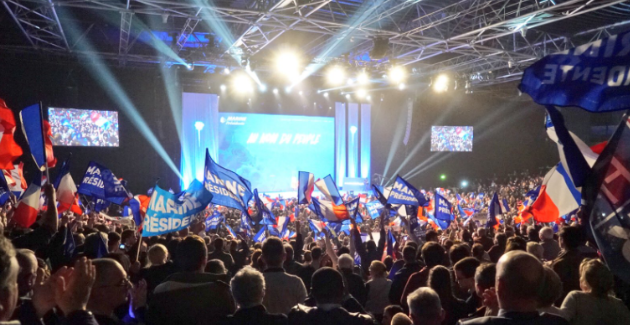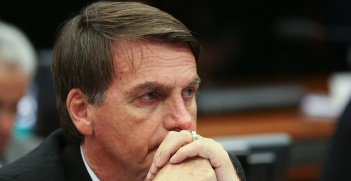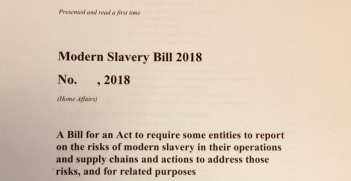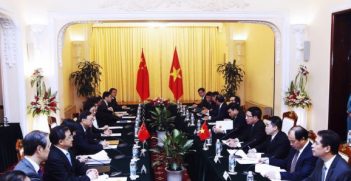Will the French Vote Bring Revolution or Paralysis?

The emergence of Marine Le Pen and Emmanuel Macron as the leading candidates in this weekend’s French presidential election reflects a crisis of faith in the country’s political elites. Looking beyond Sunday, it is unclear that either of the outsider candidates can fulfil their promises: paralysis may instead result.
In the upcoming presidential election, the French political system faces the first possibility of its complete reconfiguration since the 1958 Algerian crisis which produced the Fifth Republic. This results from a similar convergence of factors: a lack of consensus on how the problems facing the country can be resolved, society’s loss of faith in its political establishment, and a strong aspiration for profound renewal of the country’s elites. The basis on which the Fifth Republic delivered stable government—the existence of two dominant government parties vying for election—has now been destroyed by the growth of the National Front and the collapse of support for the Socialist Party.
Central to the French electorate’s crisis of faith in political elites has been the loss of French influence over the European Union (EU)’s management of the eurozone financial crisis. The financial crisis revealed new divides both within European countries and among them. It also shattered the belief underpinning France’s foreign policy since De Gaulle, that France could use the Franco-German partnership for its own benefit.
Coinciding with Sarkozy’s decision to reintegrate France fully within NATO, the crisis has encouraged the feeling that the elites no longer steer the ship. This feeling has benefitted the National Front under Marine Le Pen, which has made great progress over the last two years in European and departmental elections. The Fifth Republic’s majority-based electoral system, however, has limited the party’s parliamentary representation, contributing to mounting frustration among its supporters.
First Sarkozy, then Hollande were rejected by the French electorate because they failed to improve the economic situation in France, which has been marked by anaemic growth and high unemployment (especially for youth). This was clearly linked to the constraints imposed at EU-level by German elites, who tried to impose their own successful neo-mercantilist economic model based on public austerity and the suppression of domestic consumption. France’s disenchantment with its political representatives in the economic sphere was then aggravated by terrorism, promoting the feeling that the political establishment has failed in its most elementary duty: ensuring national security.
The rise of the National Front and its Eurosceptic stance is a symptom of the disintegration of the French political system as defined by the two mainstream parties, Les Républicains (LR) and the Parti Socialiste (PS). Both have tried in vain to counter it through attacks on its roots in ethno-nationalism but also by adopting some of its themes.
Marine Le Pen has successfully normalised her party, distancing it from its historical roots in right-wing extremism. She has transformed the party’s traditional hostility towards immigrants into a rejection of Islamic fundamentalism. She has framed her attacks on Islam in a republican discourse advocating French secularism and liberal social values, invoking the rights of women and those of homosexuals (even if she opposed the 2013 law on same sex marriage).
Le Pen has also taken over one of the traditional concern of the Left: public services. Support for the FN has become strongest in semi-rural areas where the loss of services such as post offices has led people to feel abandoned by the state. Le Pen has eaten into the vote traditionally aligned with the PS. She now advocates a parallel currency arrangement, a plan which greatly undermines claims to restore “monetary sovereignty”. But it does not matter: she deals with symbols and catchphrases to which many respond. Nor does the fact that she, like François Fillon, faces accusations of having misused EU parliamentary funds: it fits her tirades on the EU’s waste of national wealth. Like Donald Trump, she represents a new breed of successful ‘political entrepreneurs’ capitalising on the crisis of mainstream politics. All contradictions are reconciled through the ritualistic invocation of popular sovereignty.
Since the Maastricht Treaty there has been bipartisan consensus on European economic integration. Both the Republicans and the Socialist party have thus become destabilised by the eurozone’s crisis and the failure of austerity. The crisis has hit the PS hardest because of the leading role it played in the construction of the EU. Since then, the PS has tried pursuing wealth redistribution but with ever shrinking means after the French state surrendered control over monetary policy and French business was burdened by an overvalued currency.
François Hollande’s decision not to stand again for election removed the possibility of a debate on his political record and, more broadly, on France’s standing in Europe. This decision triggered a decisive primary which saw Hamon chosen because of his critical stance towards labour market reform. In 2016, the El Khomry Law was pushed through by Hollande and Prime Minister Manuel Valls despite considerable opposition across French society. Despite his reassertion of sociodemocratic values, Hamon, however, lacks credible plans to change the EU’s direction and languishes in fourth position. He is fighting for the survival of the PS which is threatened by an ideological split, worsened by Vall’s decision to align with the independent Emmanuel Macron.
The centre-right is no better placed. Fillon, chosen for his capacity to rival Le Pen in the rhetoric of sovereignty, is engulfed in corruption accusations. For much of the electorate he is now the symbol of the political establishment’s moral bankruptcy. The most likely scenario is a contest between Marine Le Pen and Emmanuel Macron, two candidates presented as outsiders.
One can, however, question this representation of the situation. The FN has long been part of the political landscape and has exercised control over some municipal governments. Macron, meanwhile, has been economics minister in a socialist government and a part of the high public service. Whilst he was not directly involved in party politics and his presidential campaign has generated a new political movement, he has certainly been part of the state establishment and a staunch supporter of EU-driven liberalism. His support base is much less stable than that of Le Pen and Fillon, casting doubt on his capacity to effect profound political renewal. For this, a fraction of the electorate is now looking to the far left candidate, Jean-Luc Mélenchon.
Mélenchon’s recent performance in two televised debates saw him make a surprising breakthrough whilst Le Pen and Macron lost ground. A renegade from the SP, which he left in 2008, Mélenchon, at the head of ‘La France Insoumise’ (Unsubmissive France) advocates a confrontation with Germany to renegotiate the terms of monetary union and, if need be, Frexit. He has a radical social program , supports extensive constitutional reform and wishes to withdraw from NATO. To make it to the second round he needs to convince those who believe voting for Macron is the only way to stop Le Pen.
The electorate is now more or less evenly split between Fillon, Le Pen, Macron and Mélenchon. With a very high rate of voters still undecided, anything is possible on 23 April. One thing is clear: none of the candidates is assured of a majority in the subsequent legislative elections. France faces possible political paralysis. What impact will the French presidential election have on the rest of Europe, with two important elections yet to come in Germany and Italy?
Dr Natalie Doyle is a specialist in French social and political thought at Monash University. She has also published on European politics. Her monograph, European democracy, depoliticization and imaginary constructs of Islam, is appearing this year with Lexington books.
This article is published under a Creative Commons Licence and may be republished with attribution.





